高三英语教案:Study skills(Word版)
高三英语教案:unin15 Study skills 上课

高三英语教案:unin15 Study skills 上课教案是教师为顺利而有效地开展教学活动,根据课程标准,教学大纲和教科书要求及学生的实际情况,以课时或课题为单位,对教学内容、教学步骤、教学方法等进行的具体设计和安排的一种实用性教学文书,包括教材简析和学生分析、教学目的、重难点、教学准备、教学过程及练习设计等,下面是由小编为大家整理的范文模板,仅供参考,欢迎大家阅读.Lesson 57 教学设计方案StepI:Reading:I). Main factsFind out the right topic sentence for each paragraph.Paragraph 1 _____ Paragraph 2 _____Paragraph 3 _____ Paragraph 4 _____Paragraph 5 _____ Paragraph 6 _____II). Further reading1. Which is the most important tip the author wants to give us in the passage?A. Three ways of reading.B. Enjoy our reading.C. How to decide what to read.D. How to guess the unknown words.2. “It’s enough to dip into it and read bits here and there.” The underlined phrase in the above sentence can be replaced by ______.A. put intoB. tasteC. swallowD. chew and digest3. When corning across a new word in reading, we_______.A. should never turn to a dictionary for helpB. have to guess its e_act meaning from the conte_t (上下文)C. can get some hints (提示) from the situation and repeated e_amplesin the te_tD. needn’t pay any attention to it4. The following tips E_CEPT _________ can help you decide whether a book is worth chewing and digesting.A. to make sure the book is the one you can easily read and understandB. to get an idea of the organization of the bookC. to read the first few chapters very slowly and CarefullyD. to see whether the book will interest you or not5. “But not all the stories belong to this class.” The underlined word in the above sentence has the same meaning as the one in “_________”A. I have been twice at the French class at Morris’s.B. All matter can be divided into 3 classes: compounds, mi_tures and elements.C. He has a prejudice (偏见) against the English middle class.D. Are you in the first-year class or the second-year class?6. An interesting magazine, which you may read in a tor’s waiting room, belongs to the books for ________.A. swallowingB. tastingC. chewing and digestingD. A _ B7. Which of the following is WRONG?A. Our hobbies can sometimes help to decide what to read.B. It is suggested in the passage that we should use a dictionary when necessary.C. If you chew and digest a book, it just means that you read it very slowly.D. Reading cannot only help to improve our English but also enlarge our knowledge.Keys:1. B2. B3. C4. C5. B6. D7. Cnguage points:I)Learn the words by the conte_t:1.Some books are to be tasted, others to be swallowed, and some few to be chewed and digested.2.Other books are for reading slowly and carefully. If it is a book ona subject that you are interested in, you will want to “chew and digest it”.3.For e_ample, you might pick up a travel book and read a few pages before going to sleep.It is enough to dip into it and read bits here and there. In a word, this is “tasting”.2)The chemistry teacher dipped a finger into the cup and showed it to the class.Then, he put a finger in his mouth, tasted it and smiled. (Lesson6 of BookI)II)Put the following into Chinese, paying attention to the underlined part.(1) I am going to sell this old car, and buy a new one.(2) It’s turned awfully chilly, and I think it’s going to rain.(3) The books you borrowed from the library are to be returned before July 5th.(4) The train is to arrive in Beijing at _:25 pm.(5) I met Christine in the door way just as she was about to go away.(6) Johnny was about to say something more about the problem, but he checked himself.2. turn to/belong to/dip into/come across/ pick up(7) When our TV set broke, the repairman came in his truck to ______ it ______.(8) They met after 5 years, and ________ their friendship as if there had been no interruption.(9) Two-thirds of the members in the club_________ the wealthy class.(_) I can’t say I know a great deal about American history. I have just ________ one or two books on the subject.(_) Each student ______ a finger _______ the mi_ture and sucked it. The mi_ture tasted terrible.(_) After he left university Eric became a teacher, but later _______ journalism (新闻业).(_) Frank assured me that if I ever needed financial help I could always _______ him.(_) I ________ this book in an old bookstore on Fourth Avenue, so I got it quite by chance.3. in a word / in other words / above all /at the same time / such as / and so on(_) The band played all the evening-. Beethoven and Wagner ________ . (_) Animals that gnaw (咬、啃), _____ mice, rats, rabbits and weasels, are called rodents (啮齿动物).(_) Martin is smart, polite and well-behaved. _________, he is admirable.(_) Bruce did pass the history e_am; ______he didn’t know the subject very well.(_) Quite a few tips are given on how to be an efficient reader, but ______ we must enjoy our reading.(_) Your performance didn’t meet our demand —_________, you failed. Keys: (7) pick up (8) picked up (9) belong to (_) dipped into (_) dipped into (_) turned to (_) turn to (_) came across (_) and so on (_) such as (_) in a word (_) at the same time (_) above all (_) in other words StepIII.Cloze test:Do you read newspapers regularly? Newspaper articles 1 important and interesting information for people of all ages 2, not all information is of 3 to everyone. Fortunately, finding the sections that 5 youparticularly want to read 4 not difficult. There are probably certain sections of the paper 5 interest you most. 6 , the title of articles and the pictures 7 some clues about the contents.Once you have chosen 8 article to read, you will find the important 9 information _ the key facts in the first few paragraphs. The remainder( 其余的部分) of most articles gives _ . These details are usualy _ because they _ valuable supporting ideas to help the reader _ the key facts better.Sometimes they are simply human-interest(人类感兴趣的)details, _ background information or quotes(引用) from people in the news story. Remember this important difference _ a fiction(小说) story and a news story: the ending of a fiction story is important part.It is necessary to read only far _ in the article to understand _ has happened. The details are for people _ are more intersted in that subject.1.A. cover B.keep C.record D.contain2.A.Whatever B.Otherwise C.However D.Because3.A.interest B.interesting C.interested D.important4.A.is B.be C are D.does5.A.what B.that C it D.really6.A. Above all B. In a word C.Beside D.Apart from that7.A.give B.gives C.make D.makes8.A.a B.an C.the D.\9.A common B.ordinary C.general D.detailed_.A with B.into C.for D.and_.A facts B.details C.material D.things_.A.including B.included ed D.found_.A provided B.provides C.providing D.provide_.A.understand B.read C.see D.improve_.A so that B.such as C.instead of D.in spite of_.A. of B.from C.between D.among_.A.the B./ C.a D.an_.A.behind B.enough C.deep D.quickly_.A.what B.that C.which D.whose_.A what B.who C.whom D.whenLesson 58 教学设计方案StepI.Reading:I):Search for answers:1.What are the two meanings of the phrase “listening skills”?2.How can we become good listeners?II).Fast reading1.The phrase “listening skills” is about _____.A. the two types of listening to a foreign languageB. the arts of listening to people and learning a foreign languageC. different parts of the Chinese character tingD. how to make other people listen to you attentively2. Which of the following is NOT correct about being a good listener?A. You should listen with complete attention and respect.B. You shouldn’t watch TV while talking with others.C. You can give necessary advice to your friends in trouble.D. Don’t cut in when others are talking.3. In the view of the writer, we shouldn’t ____while talking in a group.A. take turns to listenB. ask any questionsC. look at the speakerD. speak at the same time4. When your friend is telling about her grandma’s death, you should ________.A. ask how she was feeling at the momentB. give her advice on how to get over itC. speak about a similar e_perienceD. just listen to her quietly and attentively5. The sentence “’Undivided attention’is another sign of respect” means that ________.A.you should appear to be listeningB.you may half-listenC.you should listen with complete attentionD.you must look at the speakerKeys:1. B 2. C 3. D 4. D 5. Cnguage points:I)There aret wo meanings of the phrase “listening skills”. One refers to the type of listening practice which we do when learning a foreign language.The more we practise, the better we get at listening to speech in a foreign language. The other meaning is about the art of being a good listener to other people.II)Language focus1. We all know that, _________, the situation in Afghanistan will get worse.A. if not dealt carefully withB. if dealt with not carefullyC. if not carefully dealt withD. if dealt with carefully not2. —We could have walked to this French restaurant; it was so near. —Yes. A ta_i ________ at all necessary.A. wasn’tB. hadn’t beenC. wouldn’tD. won’t be3. I would gladly pay ______ for the unusual stamp because it is of greatvalue to my collection.A. twice as muchB. twice so muchC. twice as much asD. so much twice4. The films made by Walt Disney ______ all over the world.A. is used to showB. is used to showingC. used to be shownD. used to show5. Printed on the package are a few words: “Complaints, _______, are to be addressed to the management.”A. if soB. if anyC. howeverD. in other words6. Li Yang, the founder of Crazy English, says that he copies it down _______ he conies to a beautiful sentence.A. unlessB. whileC. becauseD. every dine7. I know the teacher was ________ Jack when she spoke of a bright boy in our class.A. turning toB. corning acrossC. referring toD. picking up8. Since Joe was 67 it did not seem _________ that he would continue long in that position.A. probablyB. possiblyC. likelyD. impossible9. The newly-wed couple have been ______ a new house, but the ones they’ve seen have all beentoo e_pensive.A. looking aboutB. looking out forC. looking intoD. looking forward to_. His description of the accident disagrees _______ that of the other witness (目击者).A. onB. withC. toD. about_. A minor carelessness almost __________ him the chance of entering the famous university.A. costB. payC. tookD. made_. The Shanghaiese are making great efforts to beautify the city ______more overseas companies will come.A. in order toB. so as toC. so thatD. as a result_. Owen sent an e-mail to _____ that he was off to America with Glen.A. sayB. speakC. talkD. tell of_. I have tried to keep your advice in mind when _________ this year’s report.A. to writeB. writingC. to be writingD. written_. If Rebecca had started at nine o’clock, she _________ in London by eleven o’clock.A. must beB. could have beenC. should beD. ought to have beenKeys: 1. C 2. A 3. A 4. C 5. B 6. D 7. C 8. C 9. B _. B _. A _. C _.A _.B _. DStep III:Writing:The art of being a good listener.高三英语教案:unin_ Study skills 上课.到电脑,方便收藏和打印:。
Unit4 Study skills名师教案
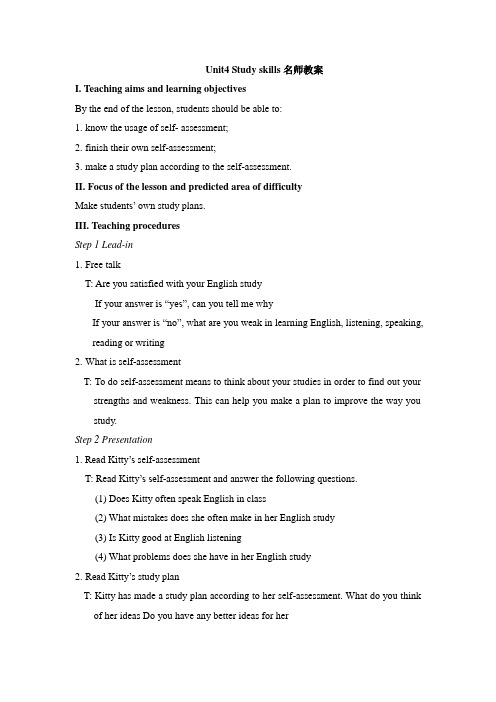
Unit4 Study skills名师教案I. Teaching aims and learning objectivesBy the end of the lesson, students should be able to:1.know the usage of self- assessment;2.finish their own self-assessment;3.make a study plan according to the self-assessment.II. Focus of the lesson and predicted area of difficultyMake students’ own study plans.III. Teaching proceduresStep 1 Lead-in1.Free talkT: Are you satisfied with your English studyIf your answer is “yes”, can you tell me whyIf your answer is “no”, what are you weak in learning English, listening, speaking, reading or writing2.What is self-assessmentT: To do self-assessment means to think about your studies in order to find out your strengths and weakness. This can help you make a plan to improve the way you study.Step 2 Presentation1. Read Kitty’s self-assessmentT: Read Kitty’s self-assessment and answer the following questions.(1) Does Kitty often speak English in class(2) What mistakes does she often make in her English study(3) Is Kitty good at English listening(4) What problems does she have in her English study2.Read Kitty’s study planT: Kitty has made a study plan according to her self-assessment. What do you think of her ideas Do you have any better ideas for her【提示:此处课堂上教师可让学生使用优教同步学习卡进行抢答,根据结果反馈,进行精准教学。
高三英语教案:unin15 Study skills 上课

高三英语教案:unin15 Study skills 上课Lesson Plan: Unite 15 - Study SkillsObjective:- To introduce and practice various study skills that will help students improve their learning and academic performance.- To enable students to actively engage in effective study techniques and strategies. - To provide opportunities for students to apply study skills in real-life situations. Materials Needed:- Whiteboard or blackboard- Markers or chalk- Handouts with study suggestions and tipsProcedure:1. Warm-up (5 minutes):- Begin the lesson by asking students to share their favorite study method or technique.- Write their responses on the board, creating a list of different study strategies.2. Introduction (10 minutes):- Present the importance of effective study skills and how they can help students succeed in their academic endeavors.- Explain that while everyone has their own preferred study methods, it is important to explore and try different techniques to find what works best for individual learning styles.3. Vocabulary Activity (10 minutes):- Introduce relevant vocabulary words related to study skills, such as note-taking, time management, active reading, etc.- Ask students to brainstorm examples and definitions for the given words.- Write the definitions on the board and encourage students to use these words throughout the lesson.4. Presentation of Study Skills (15 minutes):- Introduce and explain different study skills, such as:- Note-taking techniques: Cornell Method, Mind Maps, etc.- Effective time management: prioritizing tasks, creating study schedules, etc.- Active reading strategies: highlighting, annotating, summarizing, etc.- Memorization tips: flashcards, mnemonic devices, repetition, etc.- Discuss each study skill in detail, providing examples and explaining when and how to apply them.5. Group Discussion (10 minutes):- Divide students into small groups and assign each group a study skill to discuss and analyze.- In their groups, students should:- Share their understanding of the assigned study skill.- Reflect on its benefits and potential challenges.- Brainstorm specific situations where this study skill would be useful.- Discuss how their study skill could be improved or adapted for different subjects or learning styles.6. Group Presentations (10 minutes):- Each group presents their assigned study skill to the class, summarizing their discussions and sharing their findings.- Encourage other students to provide additional insights or ask questions.7. Application Activity (15 minutes):- Distribute handouts with study suggestions and tips.- Ask students to select one or two study skills they find most interesting or useful.- In pairs or individually, students should choose a current topic or subject they are studying and apply their selected study skills to the material.- Monitor and provide guidance if necessary.8. Wrap-up (5 minutes):- Have a brief class discussion about the application activity.- Ask students to share their experiences and thoughts on the effectiveness of the study skills they practiced.- Emphasize the importance of regularly using and refining these study skills to improve learning and academic success.Optional Extension Activities:- Assign a short homework task where students have to reflect on their study habits, identify areas for improvement, and create a personalized study plan.- Invite a guest speaker, such as a successful university student or a teacher, to share their own study skills and experiences.- Conduct a follow-up lesson to review and reinforce the study skills discussed in this lesson, allowing students to share their progress and challenges.。
Studyskills_高3英语教案完整篇.doc
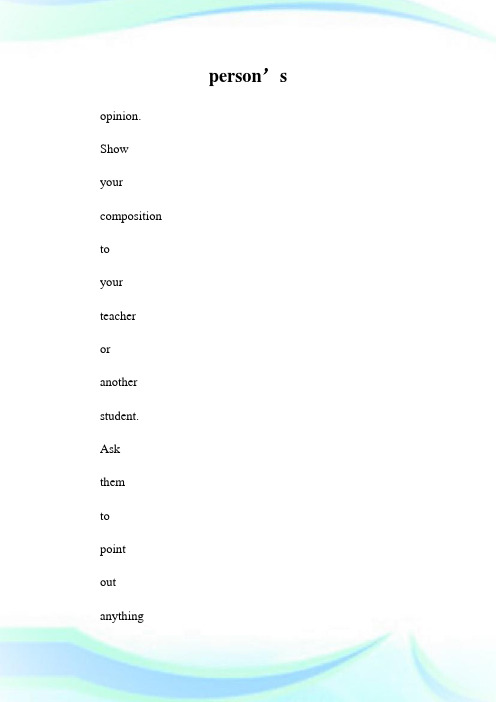
person’s opinion.Showyourcompositiontoyourteacheroranotherstudent.Askthemtopointoutanythingcouldbe improved.Whenit comestothe exam, youmaynotabletogo throughallthese stages.Butatleastyoucanfollowthis programme: Firstideas,then—plan,then—write.Studyskills_高三英语教案一、本单元的语言知识主要有:1.remindsb.ofsth.2.fixadatefor…3.on作“关于;论及”的用法4.“be+tobe+过去分词”表示“有必要做某事”、“有可能做某事”或“按计划做某事”的用法5.Dipinto表示“随便翻阅;浏览”的用法6.not作部分否定的用法7.V-ing作伴随状语的用法8.inword9.shut up10.above all11.here andthere12.once again13.lookfor14.inreply(to…)/replyto15.indifferentways16.taketurns二、本单元应掌握的日常交际用语有:l.I’dto…2.Would youliketo…3.Will you come to…?4.Ihadnoidea+从句。
三、本单元在语法方面主要复习和系统和总结行为动词和情态动词的时态,归纳了句中谓语构成的基本形式.四、英文书信是本单元在书面表达方面的教学要求。
培养做读书笔记的能力也是本单元在阅读教学方面的要求。
因为这种题型能比较客观和综合地反映学生的阅读理解能力和书面表达能力。
1.aretobetasted/swallowed/chewedanddigested是be+动词不定式被动式结构,这种结构意为某事应当、必须如何,常用在通知和说明书里。
高三英语教案:unin15 Study skills

高三英语教案:unin15 Study skillsTitle: Uni15 Study SkillsLevel: High School Grade 3Objectives:1. To develop effective study skills for high school students.2. To improve note-taking techniques.3. To enhance time management and organizational skills.4. To develop critical thinking and problem-solving abilities.5. To increase overall academic success.Materials:1. Whiteboard/markers or blackboard/chalk.2. Handouts for note-taking practice.3. Sample study schedules and time management tools.4. Multimedia resources (optional).5. Laptops/device (optional).Warm-up: (10 minutes)Ask students to share their current study habits and techniques. Discuss with the class the importance of having effective study skills in high school and beyond. Highlight the benefits of improving study skills, such as better grades, reduced stress, and improved understanding of the subject matter.Introduction: (5 minutes)Explain the objectives of the lesson and how it will help students become better learners. Emphasize the importance of developing good study skills in preparation for college or future careers.Procedure:1. Note-taking Techniques: (15 minutes)- Discuss the importance of effective note-taking.- Teach different note-taking techniques, such as Cornell method, outlining, and mind mapping.- Provide examples and model the techniques on the board.- Hand out practice exercises for students to apply the different techniques.2. Time Management and Organization: (20 minutes)- Discuss the importance of managing time effectively and being organized.- Present different strategies and tools for managing time, including creating study schedules and using to-do lists.- Have students create a study schedule tailored to their own needs and discuss the benefits of sticking to the schedule.3. Critical Thinking and Problem-Solving: (15 minutes)- Explain the significance of critical thinking and problem-solving skills in academic success and beyond.- Provide examples of critical thinking exercises and problem-solving scenarios.- Discuss strategies for analyzing and solving problems effectively.4. Practical Application and Reflection: (15 minutes)- Assign students a topic or concept to study independently using the note-taking techniques discussed.- Have them apply time management strategies to plan their study time.- After studying, ask students to reflect on their experience using the new study skills and techniques.- Encourage them to share their challenges and successes with the class.Conclusion: (5 minutes)Summarize the key points discussed in the lesson. Reinforce the importance of consistently applying effective study skills to achieve academic goals. Encourage students to continue practicing and refining these skills beyond the classroom.Homework:Assign students to review their study schedule and make any necessary adjustments. Also, have them practice the note-taking techniques on a provided reading or topic.。
高三英语教案:Study skills

高三英语教案:Study skills教学建议1. are to be tasted/swallowed/chewed and digested 是be + 动词不定式被动式结构,这种结构意为某事应当、必须如何,常用在通知和说明书里。
如:This medicine is to be taken three times a day after meals. 此药一日三次,饭后服。
Such men are to be pitied. 这种人应当得到怜悯。
This form is to be filled in in pencil. 此表须用铅笔填写。
The recorder you borrowed last week is to be returned before May 6.你上周借的收录机应当于五月六日前归还。
2. sb. + be likely + to-v. 意为某人可能做某事,还常用It + be + likely + that – cl. 结构表示某事可能发生。
如:He does not seem likely to get it from you. 他看来不可能从你这儿得到它。
An accident is likely to happen again. 可能会再次发生事故。
It’s not likely there’ll be much difficulty. 不可能有很大困难。
3.appreciate(vt.)意为喜欢,欣赏;感激;理解等。
如:That’s just because you can’t appreciate music.那正是因为你不会欣赏音乐。
I appreciate the difficulty. 我理解那个困难。
I greatly appreciate your kindness. 我非常感激你的好心。
4.offer(n.) 意为主动提供的职位,帮助等。
如:You ought to accept the offer. 你应该收下人家主动提供的帮助。
高三英语第十五单元Studyskills(学习技能)_高三英语教案

高三英语第十五单元Studyskills(学习技能)_高三英语教案lt;/#83cript科目英语年级高三文件high3unit15.doc标题Studyskills(学习技能)章节第十五单元关键词高三英语第十五单元内容一、教法建议单元双基学习目标Ⅰ.词汇学习enlarge,remindsbof,fixadatefor,appreciate,long-term,encouragementⅡ.交际英语Invitationsandresponses(邀请与应答)发出邀请时可以说:1.Willyoueto…?2.Wouldyouliketodo?3.I’dliketoinviteyouto…4.AreyoufreeonSunday?5.Ifyou’renotdoinganythingonMondaymorning,wouldyouliketodo…6.We’dlikeyoutojoinus.7.Dojoinmeforacoffee.8.We’rehavingadanceonSunday.Ihopeyouwille.9.Wouldyoudomethepleasureof attendingourwedding(婚礼)?=Maywehavethepleasureofyourpanyatourwedding?10.I’dverymuchlikeyoutoetoourdinnerparty.接受邀请时常用:1.Yes,I’dloveto.2.Yes,that’sverykind/niceofyou.3.I’dloveto,but…4.Hownice!5.I’dliketo…,but….Thankyouallthesame.Ⅲ.语法学习复习和归纳句子的成分——谓语;复习情态动词和实义动词的时态。
在情态动词中要重点掌握情态动词的完成时的用法。
如:shouldhavedone与shouldnothavedone,needn’thavedone,musthavedone另外,复习主谓一致的测试热点。
9AU3studyskills教案)
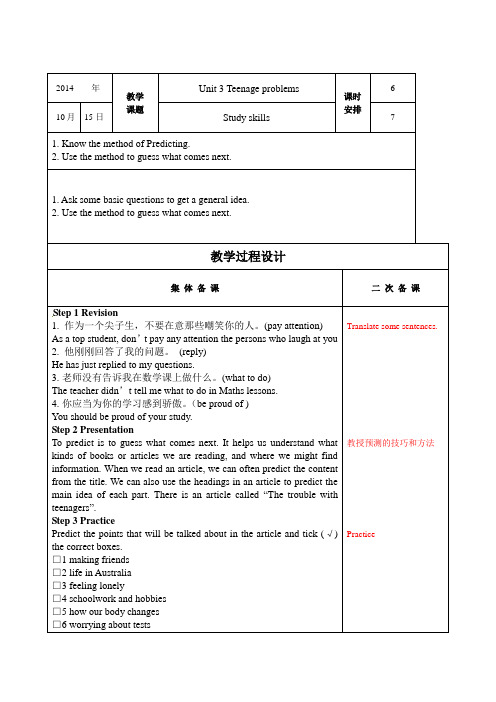
□5 how our body changes
□6 worrying about tests
□7 study, study, study
□8 love or friendship
Look at these names of the books. Which ones do you think may help you find the useful information about health?
Step 5 Homework
1.Finish Kekelian.
2. Revise this period and do some exercises.
3. Preview Task.
Translate some sentences.
教授预测的技巧和方法
Practice
Tips
教学
反思
教授预测的技巧和方法,并在课堂上完成《课》练习,加以巩固和掌握。
Step 4 Tips
If a question begins with when,then the answer will be a time or date.
If a question begins with why,then the answer will give a reason,often beginning with because.
2. Use the method to guess what comes next.
教学过程设计
集体备课
二次备课
Step 1 Revision
1.作为一个尖子生,不要在意那些嘲笑你的人。(pay attention)
高三英语教案:unin15 Study skills

高三英语教案:unin15 Study skills 教学目标1.了解研究技能的重要性2.掌握使用研究技能的方法3.提高学生在研究和写作过程中的自信心和能力教学重点1.研究方法:如何找到有用的材料并进行有效的阅读2.写作技巧:如何整理文章结构、语法和词汇教学难点1.如何有效地利用学校、图书馆等资源进行研究2.如何推动学生主动并有序地进行研究与写作教学过程第一节课•导入(10分钟):老师向学生介绍本节课将要讲述的内容——研究技能的重要性和方法•讲解(20分钟):老师讲解如何有效地搜索信息,以及如何进行系统的阅读。
重点突出信息源的重要性和如何有效选择。
•练习(20分钟):学生跟随老师一起进行练习,搜索并筛选与一个特定课题相关的文献、杂志和网页。
•总结(10分钟):老师向学生总结这节课学到的知识和方法,并提醒学生注意如何使用他们所获得的信息。
第二节课•导入(10分钟):老师提醒学生上一节课学到的方法和技能,并向学生介绍本节课所要讲述的如何进行高效的阅读和写作结构的重要性。
•讲解(20分钟):老师讲解如何进行高效的阅读,主要涉及主题句和段落大意的理解。
紧接着讲解如何设计合理的结构,以及如何选择恰当的语法和词汇。
•练习(20分钟):学生跟随老师一起进行练习,进行高效的阅读,并对文章结构进行改进和修正。
•总结(10分钟):老师向学生总结这节课学到的知识和方法,并提醒学生如何在日常生活中应用他们所学到的知识。
第三节课•导入(10分钟):老师进行总结性介绍,回溯前两节课的内容以及学生基本掌握的技能和知识。
•讲解(20分钟):老师讲解如何处理引用信息和如何进行引用。
以及如何进行修改和检查,注意语法和避免拼写错误。
•练习(20分钟):学生跟随老师一起进行练习,修改一篇没有足够证据支撑的文章,引入有力的证据,完善写作结构,以及检查和改进语法和拼写错误。
•总结(10分钟):老师向学生总结这节课学到的知识和方法,并鼓励学生更多的练习,由浅入深,不断提升他们的写作能力和研究技能。
高三英语Unit15Studyskills教案

高三英语Unit15Studyskills教案一、教学目标与要求通过本单元教学,学生应能熟练地运用表示“邀请”的常用语;复习谓语、情态动词和实义动词的时态;了解应如何正确地阅读,以及怎样做一个好的听者。
二、教学重点与难点.重点词汇dipinto,loooutfor,referto,getat,respect,enlarge,dig est,eacross.重点句型)Iaginethatyouhavefoundagoodstory,and,hatiseven oreiportant,thetietoenjoyit.)Donotstartaboounlessyoucanseefrothefirstfepage sthatitisoneyoucaneasilyreadandunderstand.)Theoreepractise,thebetteregetatlisteningtospee chinaforeignlanguage.)Thenitillbesoeoneelse'sturn..语法谓语、情态动词和实义动词的时态)Ifhees,Iilllethino.)you'realaysaingthesaeistae.)Ididn'texpecttoeetyouhere.)IfyouhavefinishedreadingtheagazinebeforeIleave ,pleasegiveitbactoe.)Hesuddenlyreeberedthathehadn'tlocedthedoor.)Thegroundiset.Itusthaverainedlastnight.)Giveoretie,ecouldfinishit..日常交际用语)ouldyoulieto…?2)I'dlietoinviteyouto…3)Havedinnerithus,illyou?4)yes,I'dloveto…5)I'dloveto,but…三、难点讲解.Iaginethatyoueacrossthissentenceinaboo.eacross碰到,遇到。
Unit15Studyskill(高三英语全年教案与练习(附答案与听力文件)文本部分)

Unit 15 Study skill一. 课文理解【单元预习】1.On reading1)What words did Francis Bacon write on the subject of reading?2)What does “tasting” mean in this passage?3)What does “swallowing” mean in this passage?4)What does “chewing and digesting” mean in this article?5)What should you do if you want to decide whether a book interests you or not?6)What is the last question that the author put forward on reading?2.The Art of Being a Good Listener7)What do the two meanings of the phrase “listening skill” refer t o?8)Are “Ear” , “your speaker” , “Eyes” , “attention” and “heart” important when you are alistener?9)What other three tips does the author mention in this article?【答疑解惑】句子分析1.Imagine that you have found a good story, and, what is even more important, the time to enjoy it.1)“what is even more important.” what结构常构成插入语。
高三英语教案:unin15 Study skills教学目标

高三英语教案:unin15 Study skills教学目标一、教学目标通过本次教学,让学生了解以下内容:1.了解各种学习策略和技能的定义和目的。
2.掌握自我评估技巧,了解如何提高自我反思和学习能力。
3.学习如何设计有针对性的学习计划,提高学习效率。
4.了解如何通过有效的管理和组织方式来克服学习障碍。
5.能够有效地运用各种学习策略和技能来解决学习问题。
二、教学重点1.学习如何针对具体的学习需求、课程及考试要求制定学习计划。
2.掌握各类学习技巧,提高自我学习能力。
3.学习如何有效地管理和组织各种学习资源。
4.学习如何有效地进行自我评价并进行改进。
5.了解各种学习策略和技能的目的和作用。
三、教学难点1.如何有效地组织和管理各种学习资源,提高学习效率和效果。
2.学生如何跟随学习计划,自我评价并进行改进。
3.学习各种学习策略和技能,并能够在学习中实践和应用。
四、教学内容与方法1.教学内容本课程主要包括:1.各种学习策略和技能的定义和目的。
2.自我评估技巧,如何提高自我反思和学习能力。
3.如何设计有针对性的学习计划,提高学习效率。
4.如何通过有效的管理和组织方式来克服学习障碍。
5.如何有效地运用各种学习策略和技能来解决学习问题。
2.教学方法1.讲解:通过PPT、演讲等方式,讲解各种学习技巧和策略,且逐步分析每个技能的定义和目的。
2.组织讨论和互动:让学生参与讨论并通过小组讨论等方式,加深对学习技巧的理解和掌握。
3.组织案例分析和演示:通过实例分析和演示,解决学生在学习中遇到的问题,更好地掌握各种学习技巧和策略。
五、教学评估1.小组讨论:学生在小组中展开讨论,共同探讨学习策略和技能的应用及作用。
每位学生发表至少一次意见。
2.案例演示:学生分享自己学习过程中遇到的问题,并展示如何应用所学技巧来解决问题。
3.课后作业:布置书面作业,要求学生根据所学内容,制定实际可行的学习计划,并在明天的课堂上分享自己的计划。
六、教学资源1.PPT:提供理论和案例图片展示。
高三 unit15 study skills 教学教案
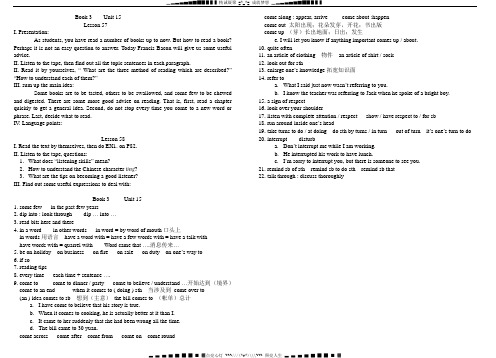
▁▂▃▄▅▆▇█▉▊▋▌精诚凝聚 =^_^= 成就梦想 ▁▂▃▄▅▆▇█▉▊▋▌▃ ▄ ▅ ▆ ▇ █ █ ■ ▓点亮心灯 ~~~///(^v^)\\\~~~ 照亮人生 ▃ ▄ ▅ ▆ ▇ █ █ ■ ▓Book 3 Unit 15Lesson 57I. Presentation: As students, you have read a number of books up to now. But how to read a book? Perhaps it is not an easy question to answer. Today Francis Bacon will give us some useful advice.II. Listen to the tape, then find out all the topic sentences in each paragraph.II. Read it by yourselves, “ What are the three method of reading which are described?” “How to understand each of them?” III. sum up the main idea: Some books are to be tasted, others to be swallowed, and some few to be chewed and digested. There are some more good advice on reading. That is, first, read a chapter quickly to get a general idea. Second, do not stop every time you come to a new word or phrase. Last, decide what to read. IV . Language points:Lesson 58I. Read the text by themselves, then do EX1. on P82. II. Listen to the tape, questions:1. What does “listening skills ” mean?2. How to understand the Chinese character ting ?3. What are the tips on becoming a good listener? III. Find out some useful expressions to deal with:Book 3 Unit 15 1. some few in the past few years 2. dip into : look through dip … into … 3. read bits here and there4. in a word in other words in word = by word of mouth 口头上in words 用语言 have a word with = have a few words with = have a talk with have words with = quarrel with Word came that ….消息传来…5. be on holiday on business on fire on sale on duty on one ’s way to6. if so7. reading tips8. every time each time + sentence ….9. come to come to dinner / party come to believe / understand …开始达到(境界) come to an end when it comes to ( doing ) sth 当涉及到 come over to (an ) idea comes to sb 想到(主意) the bill comes to (帐单)总计a. I have come to believe that his story is true.b. When it comes to cooking, he is actually better at it than I.c. It came to her suddenly that she had been wrong all the time.d. The bill came to 30 yuan.come across come after come from come on come roundcome along : appear, arrive come about :happen come out 太阳出现;花朵发芽,开花;书出版 come up (芽)长出地面;日出;发生 e. I will let you know if anything important comes up / about. 10. quite often11. an article of clothing 物件 an article of shirt / sock 12. look out for sth13. enlarge one ’s knowledge 拓宽知识面 14. refer toa. What I said just now wasn ’t referring to you.b. I know the teacher was referring to Jack when he spoke of a bright boy. 15. a sign of respect16. look over your shoulder17. listen with complete attention / respect show / have respect to / for sb 18. run around inside one ’s head19. take turns to do / at doing do sth by turns / in turn out of turn it ’s one ’s turn to do 20. interrupt disturba. Don ’t interrupt me while I am working.b. He interrupted his work to have lunch.c. I ’m sorry to interrupt you, but there is someone to see you. 21. remind sb of sth remind sb to do sth remind sb that 22. talk through : discuss thoroughly。
Unit5 Study skills 精品教案
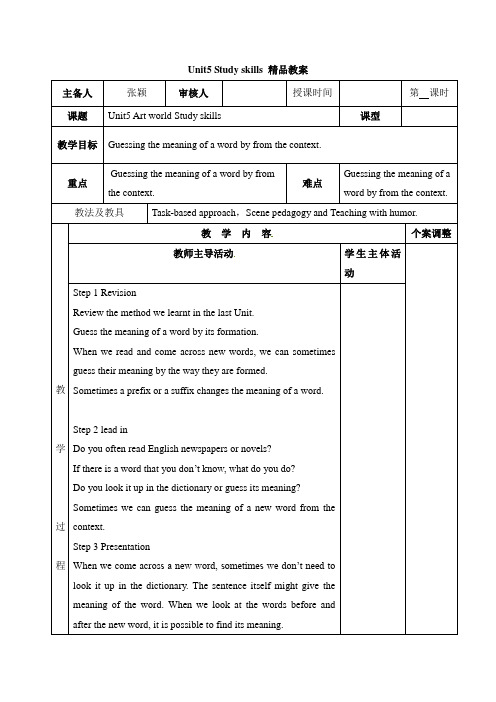
2 He replied quickly. But after he considered the problem more carefully, he felt that it was not right to make such hasty question.
Do you look it up in the dictionary or guess its meaning?
Sometimes we can guess the meaning of a new word from the context.
Step 3 Presentation
When we come across a new word, sometimes we don’t need to look it up in the dictionary. The sentence itself might give the meaning of the word. When we look at the words before and after the new word, it is possible to find its meaning.
Step5drills
1.Finish the exercises in Part A
2.Teachers give them help if necessary.
Step6 consolidation
1 Although Jane and Lisa are very close friends, they are very different.
Unit7 Study skills 精品教案
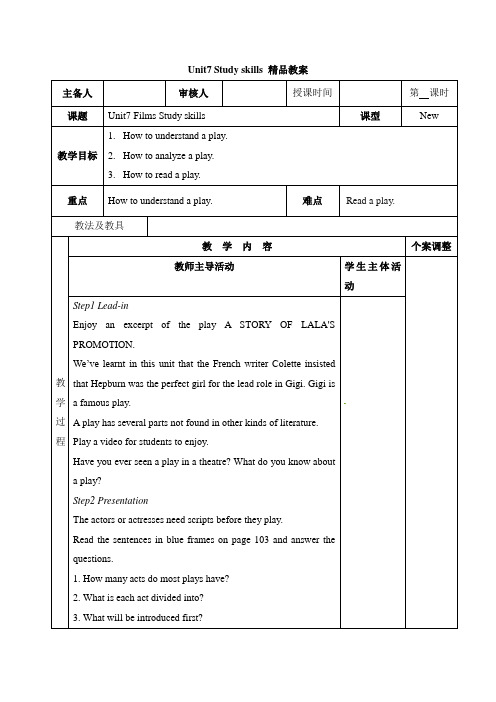
3. What will be introduced first?
4. What are the words in the brackets used for?
Ask students to read the play again. And try to answer to answer the following questions.
Unit7 Study skills精品教案
主备人
审核人
授课时间
第课时
课题
Unit7 FilmsStudy skills
课型
New
教学目标
1.How to understand a play.
2.How to analyze a play.
3.How to read a play.
重点
How to understand a play.
Answer the questions according to the excerpt.
1. Where does this scene take place?
2. Who are the characters in this scene?
3. What is Lane doing?
4. Who is playing the piano?
难点
Read a play.
教法及教具
教
学
过
程
教学内容
个案调整
教师主导活动
学生主体活动
Step1 Lead-in
Enjoy anexcerpt of the play A STORY OF LALA'S PROMOTION.
Unit3 Study skills精品学案

Unit3 Study skills精品学案一、目标导学1、帮助学生了解预测的概念。
2、帮助学生学会使用预测的方法快速了解文章的概要。
二、自学助思1、学生自行准备一份报纸或者杂志,自己预先读一读喜欢的文章。
2、解释predicting的含义及用处,引出title和heading,利用报纸或杂志上有大标题和小标题的文章解释title和heading的意思。
三、群学导引1、Lead-in : Free talk T: Do you read newspapers and magazines in your free time ? How do you get information from them ? Encourage the Ss give out their own ideas.2. T writes predicting (预测)on the Blackboard, Ss give their opinions.3. Presentation and practice(1) Ss finish the exercises in Part A on page 45 and then check the answers.(2) Encourage Ss to ask questions about the articles to predict the meaning of the article.(3) Encourage the Ss to finish part B。
四、拓展探究1、Groups work: 教师事先准备好相关报纸、杂志或者旅游指南等,让学生学会如何更好地预测文章大意。
2、学生用他们自己所带材料,根据文章的题目和小标题,要求组内成员预测文章大意和内容。
五、课后省学1、对照目标导学,总结自己本节课收获,自行开展补标活动。
2、自己找一些喜欢的材料,训练自己根据文章标题预测文章大意的技巧。
- 1、下载文档前请自行甄别文档内容的完整性,平台不提供额外的编辑、内容补充、找答案等附加服务。
- 2、"仅部分预览"的文档,不可在线预览部分如存在完整性等问题,可反馈申请退款(可完整预览的文档不适用该条件!)。
- 3、如文档侵犯您的权益,请联系客服反馈,我们会尽快为您处理(人工客服工作时间:9:00-18:30)。
高三英语教案:Study skills(2021最新版)作者:______编写日期:2021年__月__日教学目标一、本单元的语言知识主要有: 1. remind sb. of sth.2. fix a date for…3. on作“关于;论及”的用法4. “be + to be + 过去分词”表示“有必要做某事”、“有可能做某事”或“按计划做某事”的用法5.Dip into表示“随便翻阅;浏览”的用法6.not作部分否定的用法7.V-ing作伴随状语的用法8.in a word 9.shut up 10.above all 11.here and there 12.once again 13.look out for 14.in reply(to…)/reply to 15.in different ways 16.take turns 二、本单元应掌握的日常交际用语有:l.I’d love to…2.Would you like to…3.Will you come t o…?4.I had no idea + 从句。
三、本单元在语法方面主要复习和系统和总结行为动词和情态动词的时态,归纳了句中谓语构成的基本形式.四、英文书信是本单元在书面表达方面的教学要求。
培养做读书笔记的能力也是本单元在阅读教学方面的要求。
因为这种题型能比较客观和综合地反映学生的阅读理解能力和书面表达能力。
教学建议1. are to be tasted/swallowed/chewed and digested 是be + 动词不定式被动式结构,这种结构意为某事应当、必须如何,常用在通知和说明书里。
如:This medicine is to be taken three times a day after meals. 此药一日三次,饭后服。
Such men are to be pitied. 这种人应当得到怜悯。
This form is to be filled in in pencil. 此表须用铅笔填写。
The recorder you borrowed last week is to be returned before May 6. 你上周借的收录机应当于五月六日前归还。
2. sb. + be likely + to-v. 意为某人可能做某事,还常用It + be + likely + that – cl. 结构表示某事可能发生。
如:He does not seem likely to get it from you. 他看来不可能从你这儿得到它。
An accident is likely to happen again. 可能会再次发生事故。
It’s not likely there’ll be much difficulty. 不可能有很大困难。
3.appreciate(vt.)意为喜欢,欣赏;感激;理解等。
如:That’s just because you can’t appreciate music. 那正是因为你不会欣赏音乐。
I appreciate the difficulty. 我理解那个困难。
I greatly appreciate your kindness. 我非常感激你的好心。
4.offer(n.) 意为主动提供的职位,帮助等。
如:You ought to accept the offer. 你应该收下人家主动提供的帮助。
Thank you for your kind offer of help. 谢谢你的好心的帮助。
offer (.vt.) 意为(主动)提出做某事(接不定式);主动给(接名词、代词或双宾语)。
如:He offered to lend me some books. 他主动提出借几本书给我。
I have been offered a job in Spain. 有人主动为我提供在西班牙的工作。
5.短语动词 get at 意为理解,领会,掌握。
如:It is not easy to get at the meaning of every idiom in English. 要弄懂每一个英语成语的意思是不容易的。
We have finally managed to get at the facts of the matter. 我们终于设法掌握了所有的事实。
get at还表示到达;找到,得到;开始干(工作)等。
如:This village is difficult to get at. 这个村庄很难到达。
We have to get at some money somehow. 我们得设法弄点钱。
I hope I have time to get at my homeworktonight. 我希望今晚能开始做家庭作业。
6.切勿混淆so do I 和so I do so do I 属于“so + do(be,have,can)+ 主语”结构,是倒装语序。
表示同样的看法或做法。
如:Tom went swimming yesterday.汤姆昨天去游泳了,我也去了。
I can speak French. And so can my sister. 我会讲法语。
我妹妹也会。
so I do属于“so + 主语 +do(be,have,can)”结构用于赞同对方的话,或对前文提及的情况给予肯定。
如:-The workers worked very hard.-工人们工作很努力。
一So they did.他们的确如此。
7.some time,sometime,sometimes用法比较some time是名词词组,通常表示“一段时间”。
He rang again after some time.过了一会儿他又打电话来了。
It will take some time to translate this book.翻译这本书要费一些时间。
sometime是副词,表示“曾经,某时,有朝一日”,常同过去时或将来时连用。
如:Will you go and see your teacher sometime?你哪一天去看看你的老师好吗?The accident happened sometime last month.事故发生在上月某一天。
sometimes是频度副词,表示“有时候”。
如:Sometimes the little girl laughs,and sometimes she cries.这个小女孩有时笑,有时哭。
Sometimes I went to school by bike and sometimes on foot.我有时骑自行车上学,有时步行去。
8.find,find out,look for find通常强调找的结果。
其后可跟名词、复合结构或that从句。
如:Use yourhead, then you’ll find a way. 开动脑筋,就会有办法的。
He found his home village unchanged. 他发现家乡还是老样子。
find out通过观察、调查、询问等方式找出(原因等),或发现(秘密、错误)情况等,其后一般跟名词、代词或从句。
如:Have you found out his address?你查到他的住址了吗?Please find out when the train leaves.请打听一下火车什么时候开。
look for强调找的过程。
如:Do you know what he is looking for?你知道他在找什么吗?He is looking for his dictionary bought yesterday. 他在找昨天买的那本词典。
9.none与no one none作代词时,既可指人,也可指物,常常受后面of短语的限制,of后可接复数可数名词,作主语时,谓语动词可以是单数,也可以是复数,其后的可数名词或代词必须是三者以上的人或事物。
如:None of my friends smokes/ smoke. 我的朋友中没有一个抽烟。
He liked none of the books. 这些书他一本也不喜欢。
all用于否定是部分否定,而none所表达的否定是全部否定。
如:None of the books is/ are nice. 这些书没有一本是好的。
All of the books are not nice.这些书并非每本都好。
no one一般用来指人,后面不能跟of短语。
no one作主语时,谓语动词只能用单数。
如:No one knows the answer to the question.没有一个人知道这个问题的答案。
No one was killed in the traffic accident.在那次交通事故中没有一个人死亡。
nobody是不定代词,只能用于人,常与no one互换。
none和no one常用于简略答语中,none用来回答“How many…”,而no one常用来回答“Who…”,如:一How many pictures are there on the wall?墙上有几幅画?—None.一幅也没有。
-Who is in the lab?谁在实验室里?一No one(Nobody).没有人在实验室里。
10.instead与instead 彼此不能“代替”instead是副词,一般单独使用;instead of 是介词短语,后面要接宾语,如:The girl doesn’t want a pen.Give her a pencil instead.那个女孩不要钢笔,给她一支铅笔吧。
Give him a pencil instead of a pen. 给他一支铅笔,不要给他钢笔。
在句中instead的动作是被“取”的,即要做的;而instead of后面的动作是“舍”,即不做的。
如:Last winter we went to Hainan Island. This winter we are going to Guangzhou instead. 去年冬天我们去了海南岛,今天冬天将去广州。
This winter we are going to Guangzhou instead of Hainan Island. 今天冬天我们将去广州而不去海南岛。
